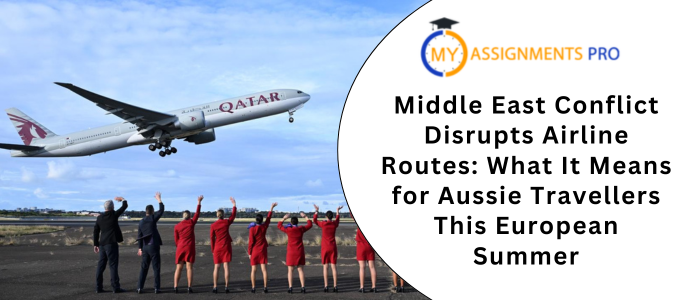
Australian travellers heading overseas this winter — especially to Europe for the busy summer holiday season — may need to brace for delays, rerouted flights, and even cancellations. The recent escalation in tensions across the Middle East has forced many international airlines to rethink their flight paths to avoid flying over volatile regions such as Iran, Iraq, Syria, Israel, and parts of Jordan.
For Australians with flights already booked, this evolving situation raises questions about travel plans, potential disruptions, and what support or recourse is available.
Why Are Airlines Changing Routes?
The catalyst for the disruptions came on 13 June when Israel launched missiles at Iran, triggering a heightened state of alert in the region. In the days that followed, further military action, including a strike by Iran on a US base in Qatar, led to several nations temporarily closing their airspace.
In response, commercial airlines quickly adjusted their flight paths to steer clear of risky zones. This means longer flight durations, last-minute schedule changes, and in some cases, cancelled routes.
Middle Eastern carriers — such as Emirates, Etihad, and Qatar Airways — are among the most impacted, as they typically use Middle Eastern airspace as a key transit corridor for flights between Australia and Europe.
What Does This Mean for Aussie Passengers?
If you’re flying from Australia to Europe, how the conflict affects you will largely depend on which airline you’ve booked with and which route your plane takes.
Professor Rico Merkert, aviation expert and deputy director of the University of Sydney’s Institute of Transport and Logistics Studies, says travellers flying with Middle Eastern carriers could face significant disruptions.
“Getting to the Middle East is probably still OK,” he explains. “But once you get there, it might be a bit hectic, with potential detours and delays. Flying into Iran is, of course, out of the question at the moment.”
Qatar Airways has already confirmed “some schedule changes” in light of the conflict, advising passengers to regularly check their website for updates. In fact, some travellers were left stranded in Doha when the airspace briefly closed following military activity in the area.
Should I Cancel or Reroute My Trip?
For Australians concerned about flying through or near conflict zones, there are alternatives. Some airlines fly to Europe via Asia instead of the Middle East. Singapore Airlines, for example, offers a safer corridor, bypassing the Gulf region entirely.
However, Jodi Bird, travel and insurance expert at CHOICE, advises travellers to wait for the airline to make the first move rather than cancelling their flights themselves.
“If you’re cancelling because you’re worried, you’re less likely to get your money back,” he says. “But if the airline cancels or reschedules, you’re far more likely to get a refund or credit.”
The Australian Competition and Consumer Commission (ACCC) supports this position, explaining that consumer protections under Australian law depend on the circumstances. If a flight is cancelled by the airline due to geopolitical issues, you may be entitled to compensation or a flight credit. But if you decide to cancel on your own, those protections might not apply.
What If My Flight Has Been Cancelled?
If your flight is cancelled due to the current Middle East conflict, the airline should offer either a refund, credit, or rebooking. However, the amount you can expect to receive depends heavily on the airline’s own terms and conditions — commonly known as “conditions of carriage”.
Bird notes that this situation is somewhat similar to the pandemic disruptions.
“Just like during COVID, the cancellations are outside of the airline’s control,” he explains. “In those cases, the airline isn’t obligated to provide a full refund — usually, a credit is more likely.”
The ACCC also reiterates that compensation might not be guaranteed if cancellations arise from third-party actions, such as governments closing airspace. Passengers are encouraged to check with their airline directly to understand their options.
Does Travel Insurance Help in This Situation?
Travel insurance can provide a safety net — but only if it covers cancellations due to conflict or airspace closures. And as with most travel products, the fine print matters.
Bird advises travellers to check the specific terms of their policies, as not all plans cover geopolitical incidents.
Tim Bennett, an insurance specialist at Finder, stresses the importance of buying insurance as early as possible in the booking process. “Whether you’re flying over conflicted zones or not, travel insurance should be part of the plan from day one,” he says.
How Are Australian Airlines Responding?
So far, Qantas has made minor changes. The airline rerouted a flight to the UK and another from Europe that was returning to Australia. However, most Qantas flights to London fly via Singapore or directly from Perth, completely avoiding Middle Eastern airspace.
As Professor Merkert notes, a QF1 flight from Sydney to London via Singapore would take a route over central Asia — not the Middle East — making it a safer option for nervous passengers.
However, there’s a catch. Qantas only flies directly to London in Europe. If you want to travel elsewhere in Europe, you’ll likely end up on a codeshare flight with Emirates, meaning a stopover in Dubai.
Qantas did not confirm any broader changes to flight schedules at the time of writing.
Virgin Australia has also been impacted, with Qatar Airways — their international partner — diverting flights such as VA1 and VA15 after Qatar’s airspace was temporarily closed.
How Are Other Airlines Reacting?
Australia reached out to more than a dozen international airlines this week to gauge their responses.
Singapore Airlines cancelled eight flights between Singapore and Dubai, citing a security reassessment. Etihad, based in Abu Dhabi, has suspended all flights to Tel Aviv until at least 15 July.
Airlines are warning passengers that last-minute disruptions and sudden airspace closures remain a strong possibility, and changes may occur without much notice.
The situation remains fluid, and airlines urge travellers to stay informed by regularly checking airline websites, flight trackers, and official social media channels.
What Can Aussie Travellers Do Right Now?
If you have a flight booked to Europe via the Middle East:
- Monitor airline updates closely.
- Check the route your flight will take. If it passes over conflict zones, contact the airline to ask about rerouting.
- Hold off cancelling your booking unless absolutely necessary.
- Review your travel insurance to ensure it covers disruptions due to geopolitical conflicts.
- Know your rights. Review the fare conditions and understand what the airline owes you if a flight is cancelled or delayed.
For peace of mind, Australians may consider booking with airlines that avoid the Middle East entirely, such as Singapore Airlines or Cathay Pacific, even if it means slightly longer travel times.
Final Thoughts
While the conflict in the Middle East is causing complications for global air travel, especially to Europe, Australian travellers can still make informed decisions and protect their holidays. Stay alert, be flexible, and ensure your insurance and airline provide the coverage and support you need in these uncertain times.
Reliable and Affordable Assignment Help Tailored to Your Needs
Struggling with tight deadlines or complex coursework? My Assignments Pro offers trusted assignment help designed to ease your academic pressure. Our team of expert writers provides high-quality, customised, and plagiarism-free assignment help that meets university standards. Whether you need assignment help in business, law, nursing, finance, or any other subject, we’ve got you covered. We deliver affordable assignment help on time, with exclusive discounts available for bulk orders. From essays and reports to technical papers and advanced projects, our comprehensive assignment help services are here to support you at every stage of your academic journey.
Source
Mitchell
Mitchell is a seasoned Ph.D. scholar with extensive expertise gained through years of rigorous research, publication, and teaching experience. He brings a wealth of knowledge and analytical skills to tackle complex academic challenges. His work is dedicated to delivering innovative solutions, advancing knowledge, and promoting academic excellence. Proficient in research methodology, data analysis, and scholarly writing, Mitchell has contributed to peer-reviewed journals and mentored students to achieve academic success.


